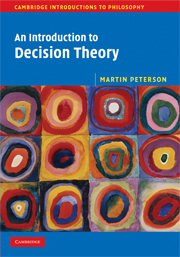Book contents
- Frontmatter
- Contents
- Preface
- 1 Introduction
- 2 The decision matrix
- 3 Decisions under ignorance
- 4 Decisions under risk
- 5 Utility
- 6 The mathematics of probability
- 7 The philosophy of probability
- 8 Why should we accept the preference axioms?
- 9 Causal vs. evidential decision theory
- 10 Bayesian vs. non-Bayesian decision theory
- 11 Game theory I: Basic concepts and zero-sum games
- 12 Game theory II: Nonzero-sum and cooperative games
- 13 Social choice theory
- 14 Overview of descriptive decision theory
- Appendix A Glossary
- Appendix B Proof of the von Neumann–Morgenstern theorem
- Further reading
- Index
9 - Causal vs. evidential decision theory
- Frontmatter
- Contents
- Preface
- 1 Introduction
- 2 The decision matrix
- 3 Decisions under ignorance
- 4 Decisions under risk
- 5 Utility
- 6 The mathematics of probability
- 7 The philosophy of probability
- 8 Why should we accept the preference axioms?
- 9 Causal vs. evidential decision theory
- 10 Bayesian vs. non-Bayesian decision theory
- 11 Game theory I: Basic concepts and zero-sum games
- 12 Game theory II: Nonzero-sum and cooperative games
- 13 Social choice theory
- 14 Overview of descriptive decision theory
- Appendix A Glossary
- Appendix B Proof of the von Neumann–Morgenstern theorem
- Further reading
- Index
Summary
The focus of this chapter is on the role of causal processes in decision making. In some decision problems, beliefs about causal processes play a significant role for what we intuitively think it is rational to do. However, it has turned out to be very hard to give a convincing account of what role beliefs about causal process should be allowed to play. Much of the discussion has focused on a famous example known as Newcomb's problem. We shall begin by taking a look at this surprisingly deep problem.
Newcomb's problem
Imagine a being who is very good at predicting other people's choices. Ninety-nine per cent of all predictions made by the being so far have been correct. You are offered a choice between two boxes, B1 and B2. Box B1 contains $1,000 and you know this, because it is transparent and you can actually see the money inside. Box B2 contains either a million dollars or nothing. This box is not transparent, so you cannot see its content. You are now invited to make a choice between the following pair of alternatives: You either take what is in both boxes, or take only what is in the second box. You are told that the predictor will put $1M in box B2if and only if she predicts that you will take just box B2, and nothing in it otherwise. The predictor knows that you know this. Thus, in summary, the situation is as follows.
- Type
- Chapter
- Information
- An Introduction to Decision Theory , pp. 187 - 199Publisher: Cambridge University PressPrint publication year: 2009



